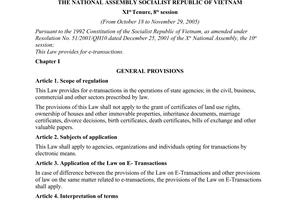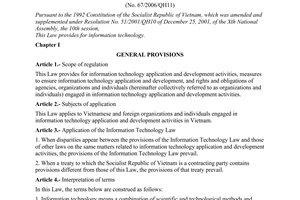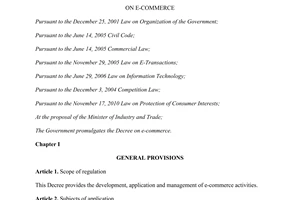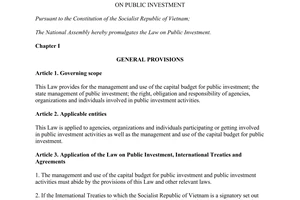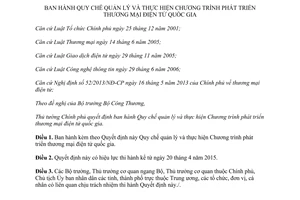Nội dung toàn văn Decision No. 07/2015/QĐ-TTg statute management national e-commerce development program
|
THE PRIME MINISTER |
SOCIALIST REPUBLIC OF VIETNAM |
|
No. 07/2015/QĐ-TTg |
Hanoi, March 02, 2015 |
DECISION
THE STATUTE ON MANAGEMENT AND IMPLEMENTATION OF NATIONAL E-COMMERCE DEVELOPMENT PROGRAM
Pursuant to the Law on Government organization dated December 25, 2001;
Pursuant to the Law on Commerce dated June 14, 20015;
Pursuant to the Law on Electronic transaction dated November 29, 2005;
Pursuant to the Law on Information technology dated June 29, 2006;
Pursuant to the Government’s Decree No. 52/2013/NĐ-CP dated May 16, 2013 on E-commerce;
At the request of the Minister of Industry and Trade,
The Prime Minister decides to promulgate the Statute on management and implementation of National E-commerce development program.
Article 1. Enclosed herewith is the Statute on management and implementation of National E-commerce development program.
Article 2. This Decision takes effect since April 20, 2015.
Article 3. Ministers, heads of ministerial-level agencies, heads of governmental agencies, the Presidents of People’s Committees of central-affiliated cities and provinces, relevant organizations, units and individuals shall be responsible for executing this Decision./.
|
|
THE PRIME MINISTER |
THE STATUTE
MANAGEMENT AND IMPLEMENTATION OF NATIONAL E-COMMERCE DEVELOPMENT PROGRAM (Enclosed with the Prime Minister’s Decision No. 07/2015/QĐ-TTg dated March 02, 2015)
Chapter I
GENERAL PROVISIONS
Article 1. Scope and regulated entities
1. This Statute regulates management and implementation of National E-commerce development program (hereinafter referred to as the Program).
2. This Statute applies to the units that preside over the implementation of projects that belong to the Program (hereinafter referred to as the Presiding unit), program management agencies and beneficiaries of the Program.
Article 2. The Presiding unit
1. The Presiding unit includes state management agencies for central and local E-commerce and Vietnam E-commerce Association.
2. The Presiding unit is eligible for receiving budget from non-business capital sources for the development and implementation of projects and shall be responsible for making final settlement as prescribed in Clauses 3, 4, 7 hereof.
3. The Presiding unit is eligible for receiving budget from investment development sources for the development of projects and shall be responsible for drawing up balance of the budget according to the Law on Public Investment and applicable guiding documents.
4. The Presiding unit is eligible for contracting with organizations, businesses and individuals for the implementation of work items within scope of project.
Article 3. Beneficiaries of the Program
Beneficiaries of the Program are businesses of all economic sectors, agencies, organizations, and agencies, organizations, and individuals involved in or supporting E-commerce application activities.
Article 4. State management agencies of the Program
1. The Ministry of Industry and Trade is the agency assigned to administer the Program and takes responsibilities for the following tasks:
a) Preside over and cooperate with Ministries, sectors and localities in disseminating orientations of e-commerce development according to strategy, planning and plans for e-commerce development approved by competent authorities;
b) Make an annual announcement of list of areas prioritized for development of e-commerce according to the Program;
c) Instruct construction and assessment of projects as prescribed hereof;
d) Examine and approve list of projects for compilation into the Program;
dd) Monitor and inspect the implementation of projects that belong to the Program;
e) Organize inspection and acceptance of result of implementation of projects and assess conformity with targets of each project and overall targets of the Program;
g) Manage administrative budget from state budget for the implementation of the Program;
h) Compile assessment of results and make the report to the Prime Minister and relevant agencies on the implementation of the Program;
2. The Minister of Industry and Trade shall decide the establishment of a council to assess projects of the Program (hereinafter referred to as the Council) with leader of the Ministry of Industry and Trade as president; components include representatives of the Ministry of Industry and Trade and representatives of relevant ministries, sectors. The Council shall assess projects constructed by the Presiding unit. The Council can invite and consult with experts during the assessment.
3. Department of E-commerce and Information Technology is the unit that helps the Minister of Industry and Trade administer the Program, responsible for instructing construction, reception and preliminary assessment of projects as prescribed hereof; making compilation and sending it to the Council; organizing supervision and inspection of the implementation of projects; organizing inspection and acceptance of projects; summarizing and making the report to the Minister of Industry and Trade; Receive and manage budget allocated for the Program by the State.
Article 5. Budget for implementation of the Program
1. Budget for implementation of the Program is comprised of the following sources:
a) Annual state expenditures including investment development expenditures and non-business capital sources;
b) Contributions made by organizations and businesses taking part in the Program;
c) Sponsorships from organizations and individuals at home and abroad;
d) Lawful sources;
2. The State shall allocate budget for the Program according to principles:
a) Current expenditures as allocated in the Ministry of Industry and Trade’s annual state expenditure estimate, supporting beneficiaries through the Presiding unit;
b) Investment development expenditures as allocated in the investment management agencies’ annual expenditure estimates;
Article 6. Criteria and principles of allocating investment development capital sources from state budget for implementation of the Program
1. E–commerce infrastructure construction and development projects with scale and targets that ensure regional and national interconnection between all sectors, fields shall be granted investment development capital sources from state budget.
2. Proportion of investment development capital sources from state budget for each particular project must be in accordance with balance of public investment capital sources and mobilization of other lawful sources.
3. Prioritize allocation of state reciprocal funds from investment development capital sources for National e–commerce infrastructure construction and development projects implemented in the form of Public-Private Partnerships;
4. Management and allocation of investment development capital sources for projects of the Program must be in compliance with the Law on Public Investment and applicable guiding documents.
Article 7. Management of budget from non-business capital sources for the Program
1. The Ministry of Industry and Trade shall formulate plans and budget estimates for the Program, make compilation into its annual budget estimates and submission to competent state agencies for approval according to law provisions.
2. After the Ministry of Finance announces budget expenditure estimates for the Program, the Minister of Industry and Trade shall carry out examination and approval for the Program and supportive budget according to the principle that total supportive budget for the implementation of the Program should not exceed approved estimates.
3. Based on the Minister of Industry and Trade’s approval decision, Department of E-commerce and Information Technology (the Ministry of Industry and Trade) shall sign a contract with the Presiding unit for the implementation of projects, and carry out payment and settlement of the supportive budget under the signed contract;
4. At least 15 days since inspection and acceptance of projects under the contract, the unit that implements projects must complete documentation of final settlement as prescribed.
5. Use of budget of the Program must accord with regulations on standards, norms and regime according to applicable laws and within budget of approved project as prescribed.
6. Brought forward expenditures:
a) State supportive budget for the Program that is half-done, or assigned or committed under a contract uncompleted shall be brought forward to the following year;
a) State supportive budget for the Program that is half-done, or assigned or committed under a contract that is uncompleted shall be brought forward to the following year;
Chapter II
CONTENTS OF THE PROGRAM AND LEVEL OF SUPPORT
Section 1. ITEMS USING INVESTMENT DEVELOPMENT CAPITAL SOURCES
Article 8. Construction and development of e-commerce infrastructure
1. The items as mentioned below regarding construction and development of e-commerce infrastructure shall be supported in investment development capital sources:
a) Construction of national e-commerce payment system;
b) Construction of integrated e-commerce payment card solutions;
c) Construction of online management system for delivery activities;
d) Construction of business to business e-communication infrastructure;
2. Activities using investment development capital sources include:
a) Procurement of equipment;
b) Development of softwares and design of information technology and e-communication system;
c) Provide consultancy, training and support to businesses and organizations for participation and use of constructed systems;
3. Level of supportive budget from state budget for each specific project shall be determined on the basis of objectives and scope of projects and balance of investment development capital sources for a five-year period and one-year period.
Section 2. ITEMS USING NON-BUSINESS CAPITAL SOURCES
Article 9. Propaganda, dissemination and enhancement of awareness about e-commerce
1. Activities of propaganda, dissemination and enhancement of awareness about e-commerce include:
a) Construct programs or special columns about e-commerce on printed, electronic newspapers, radio and television;
b) Publish publications;
c) Organize information communications about e-commerce on social networks or other means of social communications;
d) Organize workshops, exhibitions about e-commerce in the country;
dd) Construct and spread e-commerce development indices;
e) Construct and organize national prizes about e-commerce;
2. 100% support is for items as prescribed in Points b, c, dd, and e, Clause 1 of this Article, 70% support for items as prescribed in Points a, d, Clause 1 of this Article.
Article 10. Training and development of human resources for e-commerce
1. Activities of training and development of human resources for e-commerce include:
a) Organize short-term training courses at home for e-commerce businesses by locality and area of business; each training course shall be attended by at least 100 trainees;
b) Construct system of school materials serving research, teaching and learning about e-commerce;
c) Construct and organize implementation of e-commerce training programs suited for practical demands;
2. 100% support is for items as prescribed in Points b, c, Clause 1 of this Article if beneficiaries are officials of state management agencies; a maximum of 70% support for items as prescribed in Points a, Clause 1 of this Article, and for items as prescribed in Points b, c, Clause 1 if beneficiaries are not officials of state management agencies.
Article 11. Development of e-commerce products, solutions
1. Development of e-commerce products, solutions to support businesses and state management agencies in the application of e-commerce:
a) Online selling solutions for medium and small businesses by operation model or area of business;
b) E-commerce trading exchange on which at least 300 businesses can participate;
c) E-commerce application solutions for mobile devices; each solution satisfies access of at least 500 users at the same time;
d) Digitalized information development solutions for e-commerce;
dd) Programs and solutions for building online brands for key domestic goods and services;
e) Set of solutions satisfying online orders for medium and small enterprises;
g) Solutions for confidentiality and safety of information for e-commerce transactions;
h) Online public service applications for state management agencies and businesses; each application has at least 100 units as its users;
i) Message and data exchange standards in e-commerce;
k) Pilot models for research and construction of e-commerce infrastructure and software applications run on these systems;
l) The system ensures reliability of online shopping activities and online settlement of disputes.
2. Activities of development of e-commerce products, solutions include:
a) Hire experts at home and abroad to provide consultancy on solution development;
b) Develop softwares and design systems to run e-commerce solutions;
c) Provide consultancy, training and support to businesses and organizations for participation and use of e-commerce products and solutions;
d) Maintain, operate and develop users for the first two years for developed products and solutions;
3. 70% support is for items as prescribed in Clauses 1, 2 of this Article;
Article 12. Consultancy on building e-commerce application plans
1. Activities of consultancy on building e-commerce application plans include:
a) Organize inspection, investigation and statistical reporting on e-commerce application by individuals, businesses and organizations;
b) Conduct market research on e-commerce;
c) Conduct research and building of strategy and plan for e-commerce development by locality and area of business;
2. 100% support is for items as prescribed in Clauses 1 of this Article;
Article 13. International cooperation on e-commerce
1. Participate in activities of international cooperation on e-commerce in the following manners:
a) Activities of international cooperation on e-commerce at international economic and commercial organizations;
b) Activities of bilateral or multi-lateral cooperation aimed at fostering cross-border e-commerce and paperless trade;
2. Activities of international cooperation on e-commerce include:
a) Organize delegation to participate in meeting sessions, workshops and events on e-commerce at international economic and commercial organizations;
b) Organize delegation to carry out exchanges and study for the development of mechanism of bilateral cooperation with other countries and territories aimed at fostering cross-border e-commerce and paperless trade;
3. 100% support is for officials from state management agencies; a maximum of 50% support for officials from businesses, organizations that participate in activities as prescribed in Clauses 1, 2 of this Article.
Article 14. Enhancement of management and organization capability for e-commerce development activities
1. Activities of enhancement of management and organization capability for e-commerce development activities include:
a) Organize short-term e-commerce training courses at home for organizations and state management agencies;
b) Organize short-term e-commerce training courses abroad for organizations and state management agencies;
c) Publish instruction and reference books regarding state management experience in e-commerce from developing countries;
2. 100% support is for items as prescribed in Clauses 1 of this Article;
Article 15. Other activities
Other activities under the Program and level of support for each specific case shall be decided by the Prime Minister.
Chapter III
BUILDING AND IMPLEMENTATION OF THE PROGRAM
Section 1. FORMULATION AND IMPLEMENTATION OF PROJECTS USING INVESTMENT DEVELOPMENT CAPITAL SOURCES
Article 16. Formulation and implementation of projects using investment development capital sources (that belong to the Program)
1. Proposals for policies on investment and implementation of e-commerce infrastructure construction and development projects using investment development capital sources are instructed in accordance with applicable regulations on use of public investment capital sources
2. Process of project appraisal:
a) The Presiding unit shall send the project to the Appraisal Council before March 31 of the year prior to the plan year. Before May 31 of the same year, the Appraisal Council shall dispatch a written notice about result of appraisal to the Presiding unit.
b) Result of appraisal announced by the Appraisal Council shall be considered as compulsory information in the documentation submitted to competent authorities for examination and approval for the project.
3. Proportion of the project’s investment capital from state budget must ensure implementation schedule and conformity with balance of investment development capital sources by sector, field in medium-term and annual plans.
Section 2. FORMULATION AND IMPLEMENTATION OF PROJECTS USING NON-BUSINESS CAPITAL SOURCES
Article 17. Formulation of project
1. The Presiding unit shall formulate the project including information as follows:
a) Explanations of experience and qualification of the Presiding unit;
b) Necessities and suitability of the project;
c) Activities;
d) Detailed budget estimates, level of support from the Program’s budget source, reciprocal funds (if any);
dd) Implementation schedule;
e) Results and expected products;
g) Assessment of efficiency and impact of the project;
2. Projects must satisfy the following requirements:
a) Accord with demands for e-commerce development of businesses and community;
b) Accord with orientations of e-commerce development approved by competent authorities;
c) Accord with strategy and planning for development of economic regions, sectors and localities approved by the Government;
d) Accord with contents of the Program in each stage approved by the Prime Minister;
dd) Ensure feasibility of development method; development schedule; human and financial resources, material and technical base;
e) For projects lasting all through two financial years, the Presiding unit must formulate content and budget for each year.
Article 18. Reception and assessment of projects
1. The Presiding unit shall send the project to Department of E-commerce and Information Technology (the Ministry of Industry and Trade) before March 31 of the year prior to the plan-year.
2. Department of E-commerce and Information Technology shall assess and compile contents of projects and make the submission to the Appraisal Council.
Article 19. Appraisal and approval for projects
1. The Appraisal Council shall carry out appraisal of the projects compiled by Department of E-commerce and Information Technology.
2. Based on result of appraisal announced by the Appraisal Council, Department of E-commerce and Information Technology shall compile and make the submission to the Ministry of Industry and Trade for approval.
Article 20. Revision and cancellation of implementation of projects
1. In case the approved project is subject to revision or cancellation of implementation, the Presiding unit must issue a written notice specifying the reasons and propose plans for revision to Department of E-commerce and Information Technology for appraisal.
2. In case revisions to the project are necessary to suit specific circumstances, based on written proposals from the Presiding unit, Department of E-commerce and Information Technology shall make the submission to the Ministry of Industry and Trade for consideration and decision.
3. In case the Presiding unit fails to adhere to approved objectives, contents and schedule of the project or upon finding contents of the project are no longer appropriate, Department of E-commerce and Information Technology shall make the submission to the Ministry of Industry and Trade for consideration and decision on cancellation of the project.
4. In case the project can not be implemented or uncompleted in the plan-year, the Presiding unit shall be responsible for making the report to Department of E-commerce and Information Technology for submission to the Ministry of Industry and Trade for consideration and decision.
5. After the decision on revision or cancellation of the project is issued, the Ministry of Industry and Trade shall carry out transfer of the remaining budget (if any) as supplements to approved projects subject to cost variations or new projects.
Chapter IV
IMPLEMENTATION
Article 21. Responsibilities of ministries
1. The Ministry of Industry and Trade
a) Preside over instruction and implementation of this Statute;
b) Preside over and cooperate with relevant agencies in monitoring and inspecting the implementation of the Program, ensuring the Program is implemented in accordance with requirements, objectives, contents, schedule and law provisions;
c) Monitor and compile the implementation of the Program; make the report to the Prime Minister on issues beyond this Statute or competence;
d) Summarize the implementation of the Statute; make the report to the Prime Minister for consideration and decision on amendments, supplements to the Statute if necessary;
2. The Ministry of Finance:
a) Arrange annual budget for the implementation of the Program as prescribed in the Law on State Budget;
b) Cooperate with the Ministry of Industry and Trade in instructing, inspecting and monitoring the implementation of the Program;
3. The Ministry of Planning and Investment:
a) Arrange investment development capital sources for the implementation of investment projects that belong to contents of the Program;
b) Cooperate with the Ministry of Industry and Trade in instructing, inspecting and monitoring the implementation of the Program;
Article 22. Responsibilities of the Presiding unit
1. Organize the implementation of approved projects in accordance with objectives, contents, schedule and cost estimates under the signed contract; ensure effective use of the budget and take responsibilities for expenses according to applicable financial regulations;
2. Make annual report on the implementation of the project to Department of E-commerce and Information Technology before December 01 of the same year;
3. Make provision of sufficient and accurate information in connection with the implementation of the project and create favorable conditions for the task of inspection and monitoring as prescribed;
Article 23. Inspection and implementation of the Program
1. The Ministry of Industry and Trade shall cooperate with the Ministry of Finance, the Ministry of Planning and Investment in conducting regular or unexpected inspection; carry out assessment of the implementation of tasks and objectives of projects, ensure purposeful and effective management and use of the Program’s budget;
2. The Ministry of Industry and Trade shall not receive projects for the following years if the Presiding unit thereto violates obligations as prescribed in Clauses 1, 2, Article 22 hereof.
3. The Ministry of Industry and Trade shall not receive projects for the following three consecutive years if the Presiding unit thereto violates obligations as prescribed in Clause 3, Article 22 hereof.
4. Any organization or individual that commits acts of violation hereof shall be dealt with by the laws depending on the severity of violations. /.
------------------------------------------------------------------------------------------------------
This translation is made by LawSoft and
for reference purposes only. Its copyright is owned by LawSoft
and protected under Clause 2, Article 14 of the Law on Intellectual Property.Your comments are always welcomed



